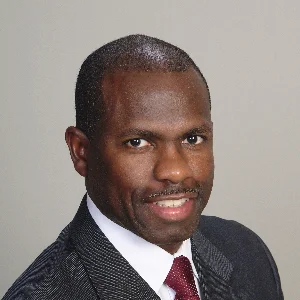Cleon Davis is the Chair of the Electrical and Computer Engineering Program and a member of the Principal Professional Staff at the Johns Hopkins University Applied Physics Laboratory. He received B.S. and M.S. degrees in Electrical Engineering from Florida A&M University, and he received the M.S. and Ph.D. degrees in Electrical and Computer Engineering from the Georgia Institute of Technology.
Education History
- B.S., Electrical Engineering, Florida Agricultural & Mechanical University
- M.S. ECE, Electrical and Computer Engineering, Georgia Institute of Technology
- M.S., Electrical Engineering, Florida Agricultural & Mechanical University
- Ph.D., Electrical and Computer Engineering, Georgia Institute of Technology
Work Experience
Principal Professional Staff, JHU Applied Physics Laboratory
Publications
Journals
[1] R. J. Pratap, P. Sen, C. Davis, G. S. May, and J. Laskar, “Neuro-Genetic Design Centering,” IEEE Transactions on Semiconductor Manufacturing, Vol. 19, No. 1, pp. 173-182, May 2006.
[2] C. Davis and G. S. May, “Neural Network Control of Variable-Frequency Microwave Processing of Polymer Dielectric Curing,” IEEE Transactions on Electronics Packaging Manufacturing, Vol. 31, No. 2, pp. 104-113, April 2008.
[3] C. Davis, A. Dickherber, W. Hunt, and G. S. May, “ In-situ Temperature Monitoring of Variable Frequency Microwave Processing of Polymer Dielectric Curing,“ IEEE Transactions on Electronics Packaging Manufacturing, Vol. 31, No. 4, pp. 273-284, October 2008.
[4] D. Olson, S. Bruder, A. S Watkins, C. Davis, “Camera Aided Dead-Reckoning Localization of Autonomous Mobile Robots in Unstructured Global Navigation Satellite System Denied Environments,” World Academy of Science, Engineering and Technology International Journal of Mechanical and Materials Engineering, Vol:16, No:5, May 2022
Conference Proceedings
[1] C. Davis, A. Dickherber, W. Hunt, and G. S. May, “An Acoustic Temperature Sensor to Monitor Variable Frequency Microwave Curing of Polymer Dielectrics,“ 2007 IEEE Sensors, pp. 832-835, October 2007.
[2] D. Cepeda, C. Davis, and G. S. May, “Identification of Significant Process Parameters in Variable Frequency Microwave Curing,” Proceedings of the IEEE SoutheastCon 2007, pp. 590-594, March 2007.
[3] J. Auerbach, C. Davis, J. Gordon, and G.S. May, “A Comprehensive Examination of the Impact of the Summer Undergraduate Research Program on Minority Enrollment in Graduate School,” Proceedings of the American Society for Engineering Education Conference, 2007.
[4] C. Davis, S. Hong, R. Setia, R. Pratap, T. Brown, B. Ku, G. Triplett, and G. May, “An Object-Oriented Neural Network Simulator for Semiconductor Manufacturing Applications,” The 8th Annual Multi-Conference on Systemics, Cybernetics, and Informatics, Orlando, FL, July 2004.
[5] C. Davis, R. Tanikella, T. Sung, P. Kohl, and G. May, “Optimization of Variable Frequency Microwave Curing using Neural Networks and Genetic Algorithms,” 53th Proceeding of Electronic Component and Technical Conference, New Orleans, LA, pp. 1718-1723, 2003.
[6] C. Davis, R. Tanikella, P. Kohl, and G. May, “Neural Network Modeling of Variable Frequency Microwave Curing,” 52nd Proceeding of Electronic Component and Technical Conference, San Diego, CA, pp. 931-935, 2002.
[7] M. Tiller, C. Davis, H. Tummescheit, and, N. Trigui, “Powertrain Modeling with Modelica”, Proceedings of the ASME Dynamic Systems and Control Division, Orlando, FL, vol. 1, pp. 591-598, 2000.
[8] C. Davis, and P. Peng, “Reinforcement Tuning of Type II Fuzzy Systems,” Proceeding of the American Controls Conference, San Diego, CA, vol. 4, pp. 2315-2319, June, 1999.
Poster Presentations without Proceedings
[1] D. Cepeda and C. Davis, “Statistical Experimental Design of Variable Frequency Microwave Curing for Semiconductor Packaging,” Intel Opportunity Scholars Program: Poster Competition, Atlanta, GA, April 2006. [First Place Poster]
[2] C. Davis, J. Harry, M. Cupta, P. Joseph, P. Kohl, and G. May, “Neural Network Modeling of Acid-Catalyzed Degradation of Photosensitive Polycarbonates,” IEEE/CMPT International Symposium and Exhibition on Advanced Packaging Materials: Processes, Properties, and Interfaces, Atlanta, GA, March 2006.
[3] C. Davis, S. Hong, R. Setia, R. Pratap, T. Brown, B. Ku, G. Triplett, and G. May, “Neural Network Simulator for Semiconductor Manufacturing Applications,” GEM Future Faculty and Professionals Symposium, Las Vegas, NV, June 11, 2004.
[4] T. Sung, C. Davis, G. May, S. A. Bidstrup-Allen, and P. Kohl, “Low Temperature Variable Frequency Microwave Curing of Polymer Dielectrics,” IAB Meeting, Packaging Research Center, Atlanta, GA, September 2003.
[5] C. Davis and G. May, “Modeling and Control of Microwave Curing,” Interconnect Focus Center, Advisory Board Meeting, Atlanta, GA, September 2001.
Oral Presentations without Proceedings
[1] C. Davis, “Modeling, Optimization, Monitoring, and Control of Variable Frequency Microwave Processing of Polymer Dielectric Curing,” John Hopkins University Applied Physics Laboratory, April 2007.
[2] C. Davis, “Modeling, Optimization, and Monitoring of Polymer Dielectric Curing of Variable Frequency Microwave Processing,” 2006 ONR Future Faculty Symposium, Greensboro, NC, January 2006.
[3] C. Davis “Transitioning to the Nanolevel,” Nanoscience + Nanotechnology @ Georgia Tech (Nano@Tech), Video Interview, http://nano.gatech.edu/education/profiles/davis.php, November 2005.
[4] C. Davis, “The Importance of Mentoring,” Intel Opportunity Scholars: End of the Year Banquet, Atlanta, GA, April 2005.
[5] C. Davis, “Neural Modeling, Genetic Optimization, and In-situ Monitoring of a Polymer Dielectric Cured using Variable Frequency Microwave Processing,” NSBE: Tech Talk, Boston, MA, March 2005.
[6] C. Davis, “Modeling, Optimization, Monitoring, and Control of Polymer Dielectric Curing of Variable Frequency Microwave Processing,” Future Faculty Career Exploration Program, Rochester Institute of Technology, Rochester, NY, October 2004.
[7] C. Davis, “Optimization of Variable Frequency Microwave Curing using Genetic Algorithms,” Georgia Tech Graduate Technical Symposium, Atlanta GA, February 2003.
Honors and Awards
- Office of Naval Research (ONR) Doctoral Fellowship (2006)
- NSF-FACES Fellowship (2005)
- FOCUS – Texas Instruments Fellowship (2005)
- NSF-Integrative Graduate Education and Research Traineeship Fellowship (2003)
Professional Organizations
Institute of Electrical and Electronics Engineers
